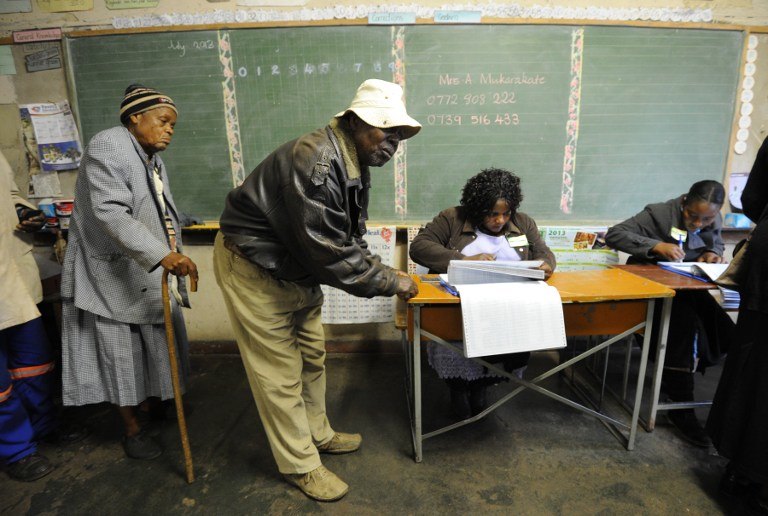SUMMARY
This is AI generated summarization, which may have errors. For context, always refer to the full article.

HARARE, Zimbabwe – Counting was underway in Zimbabwe’s tightly fought election Wednesday, July 31, amid high turnout and accusations of rigging by President Robert Mugabe’s allies who wish to extend his 33-year rule.
The 89-year-old Mugabe is Africa’s oldest leader and is running for office for the seventh and perhaps final time.
His rival Morgan Tsvangirai hopes the election will usher in a new era for the troubled southern African nation.
Organizers reported high turnout across the country for the first election since the violent polls of 2008, that led to an uneasy power-sharing government between the two men.
There were no reports of widespread violence this time round, despite the fierce rhetoric of the campaign.
At many stations voters started queueing before sunrise in the winter cold and hours before polls opened.
The lines continued well into the evening, with many marking their ballots by candle light.
Organizers said voters still waiting at closing time would get a chance to vote.
“All persons who are in the queues and ready to cast their ballots should be allowed to do so even if it takes us to midnight tonight,” said Rita Makarau, chairwoman of the Zimbabwe Electoral Commission.
Mugabe voted before lunchtime in a Harare suburb, where he insisted the poll would reflect the will of the people.
“I am sure people will vote freely and fairly, there is no pressure being exerted on anyone,” he said.
The one-time teacher came to prominence as a hero of Africa’s liberation movement, guiding Zimbabwe to independence from Britain and white minority rule.
But his military-backed rule has been marked by a series of violent crackdowns, economic crises and suspect elections that have brought international sanctions and made him a pariah in the West.
On Tuesday, July 30, he vowed to step down if Tsvangirai is the victor.
“If you lose you must surrender,” he said, insisting: “We have done no cheating.”
But Tsvangirai, the current prime minister, said that promise should be taken “with a pinch of salt”.
Tsvangirai won the first round of voting in 2008, but was forced out of the race after 200 of his supporters were killed and thousands more injured in suspected state-backed attacks.
But the 61-year-old former union boss has repeatedly voiced concerns that the election is being rigged.
Tsvangirai’s party on Wednesday listed a battery of alleged irregularities including thousands of voters finding their names missing from the electoral roll.
“Thousands and thousands of people are being disenfranchised,” said Finance Minister Tendai Biti, a senior member of Tsvangirai’s Movement for Democratic Change.
Biti, speaking after a meeting with the electoral commission, added: “They are admitting that there’s still two million people who are dead on the voters’ roll, but they said ‘because they’re dead, they can’t vote’.”
The MDC had on Tuesday handed what it claimed was documentary evidence of duplicate and ghost voters to observers from the Southern African Development Community (SADC).
With no Western groups allowed to cover the presidential and parliamentary poll, SADC’s account of events will be closely watched.
The African Union, which has been accused of white washing problems in the run up to the vote, said initial reports indicated it was “peaceful, orderly, free and fair.”
Tsvangirai cut a confident figure as he cast his own ballot, predicting his MDC would win “quite resoundingly”.
“This is a very historic moment for all of us,” he said. It is the time to “complete the change.”
Turnout appeared to be particularly brisk in the urban areas where Tsvangirai has enjoyed his strongest support, and which he must retain to stand any chance of victory.
First-time voter Gamuchirai, dressed in red track suit pants and a pink sports jacket, pulled out her left hand from her pocket to proudly show off her index finger that had been dipped in purple ink for the ballot.
“A good Zimbabwe, that’s all we want, where there is electricity, jobs and water. I hope it will come,” said the 20-year-old college student.
But some analysts cautioned against interpreting the high urban turnout as a sign Tsvangirai would sweep the election.
“This election is going to be decided in the rural areas,” where two thirds of Zimbabweans live and where Mugabe enjoys strong support, said Michael Bratton, founder of polling organization Afrobarometer.
“That margin is exaggerated by the fact that voter registration has been very heavy in those areas and been suppressed in the towns.”
“There is a very real possibility that (Mugabe’s party) ZANU-PF could marshall enough votes to win the presidential election.”
Some 6.4 million people, around half of the population, are eligible to vote and a candidate needs 50 percent of the vote to avoid a run-off.
The sharp tongued Mugabe has focused his campaign on bashing homosexuals and on promises to widen the redistribution of wealth to poor black Zimbabweans.
Amid recovery from an economic crisis that saw mass unemployment and galloping inflation, Mugabe loyalists insist their hero is “tried and tested”.
Tsvangirai hopes his plans to lure back foreign investors, create a million jobs in five years and improve public services will deliver a long-awaited victory.
The final results are expected within five days. – Rappler.com
Add a comment
How does this make you feel?
There are no comments yet. Add your comment to start the conversation.